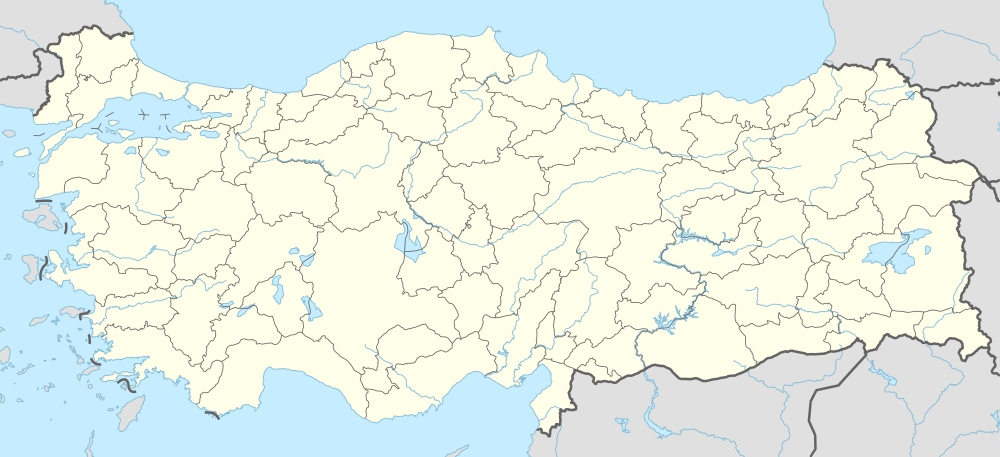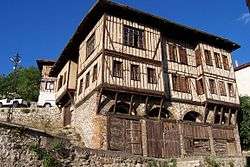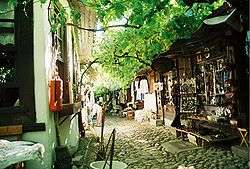Safranbolu
| City of Safranbolu | |
|---|---|
| Name as inscribed on the World Heritage List | |
 | |
| Type | Cultural |
| Criteria | ii, iv, v |
| Reference | 614 |
| UNESCO region | Europe and North America |
| Inscription history | |
| Inscription | 1994 (18th Session) |
| Safranbolu | |
|---|---|
| District | |
|
A street in historical Shoe-makers market of Safranbolu | |
 Location of Safranbolu within Turkey. | |
 Safranbolu Location of Safranbolu | |
| Coordinates: 41°15′N 32°41′E / 41.250°N 32.683°E | |
| Country |
|
| Region | Black Sea |
| Province | Karabük |
| Government | |
| • Mayor | Necdet Aksoy (AKP) |
| Area[1] | |
| • District | 999.99 km2 (386.10 sq mi) |
| Elevation | 485 m (1,591 ft) |
| Population (2012)[2] | |
| • Urban | 43,060 |
| • District | 55,170 |
| • District density | 55/km2 (140/sq mi) |
| Time zone | EET (UTC+2) |
| • Summer (DST) | EEST (UTC+3) |
| Postal code | 78xxx |
| Area code(s) | 370 |
| Licence plate | 78 |
| Climate | Cfa |
| Website | www.safranbolu.bel.tr |
Safranbolu (from Greek: Σαφράμπολις) is a town and district of Karabük Province in the Black Sea region of Turkey. It is about 200 kilometres (120 mi) north of Ankara and about 100 km south of the Black Sea coast, or more precisely about 9 km north of the city of Karabük. Former Turkish names of the town were Zalifre and Taraklıborlu and in Greek Theodoroupolis, Θεοδωρούπολις (i.e. city of Theodorus or female Theodora) and latter Saframpolis, Σαφράμπολις. It was part of Kastamonu Province until 1923 and Zonguldak Province between 1923 and 1995.
According to the 2000 census, the population of the district is 47,257, of which 31,697 live in the town of Safranbolu.[3] The district covers an area of 1,000 km2 (386 sq mi),[4] and the town lies at an elevation of 485 m (1,591 ft).
The Old Town preserves many old buildings, with 1008 registered historical artifacts. These are: 1 private museum, 25 mosques, 5 tombs, 8 historical fountains, 5 Turkish baths, 3 caravanserais, 1 historical clock tower, 1 sundial and hundreds of houses and mansions. Also there are mounds of ancient settlements, rock tombs and historical bridges. The Old Town is situated in a deep ravine in a fairly dry area in the rain shadow of the mountains. The New Town can be found on the plateau about two kilometers west of the Old Town.
The name of the town derives from 'saffron' and the Greek word 'polis' (city), since Safranbolu was a trading place and a center for growing saffron. Today saffron is still grown at the village of Davutobası which is 22 km east of Safranbolu and probably one of the best quality saffrons in the world.
Safranbolu was added to the list of UNESCO World Heritage sites in 1994 due to its well-preserved Ottoman era houses and architecture.
Gallery
 General view
General view General view
General view General view
General view General view
General view Roman constructions on brook under the buildings and streets at historical center
Roman constructions on brook under the buildings and streets at historical center Street in historical center
Street in historical center Brook under the buildings and streets at historical center
Brook under the buildings and streets at historical center Safranbolu Pansiyon
Safranbolu Pansiyon Traditional houses
Traditional houses Traditional houses
Traditional houses Traditional houses
Traditional houses Traditional houses
Traditional houses General view and The Mosque
General view and The Mosque

Sister cities
Notable natives
- Türker İnanoğlu, film producer.
- İzzet Mehmed Pasha, 18th century Ottoman Grand Vizier.
- Karabaşzade Hüseyin Efendi (Cinci Hoca) - Mentor of Sultan İbrahim
- Ali Gümüş, President of Association Internationale De La Presse Sportive (International Sports Press Association, or AIPS) Wrestling Commission, Journalist and author.
Notes
- ↑ "Area of regions (including lakes), km²". Regional Statistics Database. Turkish Statistical Institute. 2002. Retrieved 2013-03-05.
- ↑ "Population of province/district centers and towns/villages by districts - 2012". Address Based Population Registration System (ABPRS) Database. Turkish Statistical Institute. Retrieved 2013-02-27.
- ↑ Turkish Statistical Institute. "Census 2000, Key statistics for urban areas of Turkey" (in Turkish). Archived from the original (XLS) on 2007-07-22. Retrieved 2008-11-22.
- ↑ Statoids. "Statistical information on districts of Turkey". Archived from the original on 2010-05-26. Retrieved 2008-11-22.
- ↑ Elabuga and Safranbolu become sister cities Archived May 3, 2014, at the Wayback Machine.
See also
References
- Falling Rain Genomics, Inc. "Geographical information on Safranbolu, Turkey". Archived from the original on 2012-10-26. Retrieved 2008-11-22.
External links
| Wikimedia Commons has media related to Safranbolu. |
-
 Safranbolu travel guide from Wikivoyage
Safranbolu travel guide from Wikivoyage - Governor's official web site
- UNESCO World Heritage - Safranbolu
- Safranbolu: A Town of Traditional Houses
Coordinates: 41°14′57.80″N 32°40′59.52″E / 41.2493889°N 32.6832000°E

